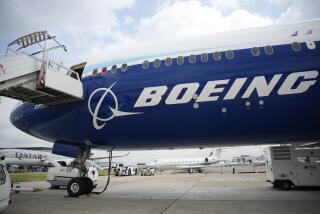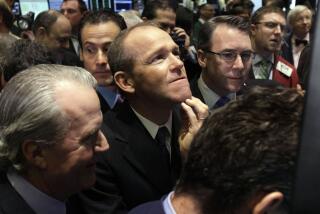Lockheed Profit Drops 43%; 2 Executives Leaving
Lockheed Martin Corp. continued a yearlong downward spiral Friday, announcing a 43% decline in its third-quarter profit, a sharp reduction in its estimate of next year’s earnings and the resignation of its president, Peter Teets.
Teets’ hasty exit is the latest in a five-month management shakeout, as the world’s largest defense firm has floundered. The Bethesda, Md.-based aerospace giant said Friday that its net income next year would plummet by half because of delays in rocket deliveries and a softening commercial space market.
The company also announced that the chief of its stumbling aeronautical business, James A. “Micky” Blackwell, would retire.
Lockheed Chairman and Chief Executive Vance Coffman said he would assume Teets’ duties and would co-chair a search committee to tap a successor.
Teets said “the difficult times we have seen are not indicative of the company’s real potential and I feel I must step up to being accountable for our disappointing financial outlook for 2000.” He also said he would resign from Lockheed’s board of directors.
Wall Street obliterated the company’s stock, sending it to a new 52-week low of $16.38 before the shares climbed back to $20--still down $2.94 for the day and more than 50% for the year.
Many analysts believe Coffman’s job to be in jeopardy, and some noted Friday that it may be difficult to find a replacement for Teets who doesn’t also insist on the chief executive’s post.
Even with the departure of the two senior executives Friday, “clearly, the earning power of the company is still the question,” said Sam Pearlstein, an analyst with ING Baring.
That power was thrown further into doubt as the company said it projects earnings next year of $1 per share, a deep cut from its earlier forecast of $2.15 per share.
For its third quarter, the company reported operating profit of $182 million on $6.2 billion in sales, or 48 cents per share. While that beat the First Call analyst consensus estimate of 47 cents per share, it represented a 43% drop from the same period last year.
“We are deeply disappointed with this reduced outlook for our company,” Coffman said. “This level of earnings and cash generation is unacceptable for Lockheed Martin.”
Over the last year, the maker of everything from jet fighters to submarine-based nuclear missiles has been bedeviled by a series of setbacks, from failed rocket launches to delays in production of its C-130J cargo planes.
Lockheed, which has absorbed a laundry list of companies amid the defense industry’s post-Cold War consolidation, responded last month with a plan to reorganize. It plans to sell off eight businesses for more than $1 billion, including the Sanders defense electronics unit, and condense its five main business segments into four.
Lockheed’s troubles this quarter arose in part from a slowdown in the commercial satellite launch market, which has taken a swift downturn as customers such as Iridium face mounting financial woes. That market turmoil has reduced the slate of launches planned for next year on Lockheed rockets and resulted in pressure on the prices of remaining launches.
Moreover, Lockheed has lost a series of lucrative contract competitions, the most prominent a $4.5-billion order for spy satellites that last month went to rival Boeing Co.
Company officials also said Friday they had not yet received much income from Comsat Corp., a satellite service firm in which Lockheed has taken a 49% interest. Lockheed said it will push legislation to allow it to acquire the rest of the company early next year.
Still, the company’s projections for 2000 appear dismal. Lockheed had said in June that cash flow--defined as earnings before noncash charges such as depreciation--would be about $900 million next year, but on Friday reduced that estimate to below $500 million.
For the quarter, net earnings were 57 cents per diluted share, down from 83 cents per share for the same period last year. Lockheed said the results were boosted by the sale of its interest in Airport Group International and of surplus real estate, which contributed about $35 million to net earnings.
The company reaffirmed its estimate of this year’s earnings at $1.50 per share, down from $2.63 last year and $3.05 the year before.
But Coffman said the outlook for 2000 means “we must redouble our efforts to restore the value and reputation of this great company.”
More to Read
Inside the business of entertainment
The Wide Shot brings you news, analysis and insights on everything from streaming wars to production — and what it all means for the future.
You may occasionally receive promotional content from the Los Angeles Times.










